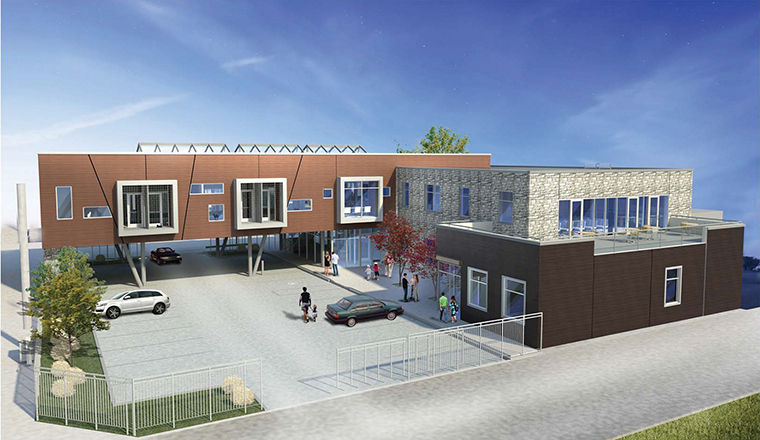Chicago’s first cat cafe to come, not without obstacles
Courtesy Tree House Humane Society
Tree House Humane Society’s new facility with cat cafe
April 6, 2015
Leave your kittens at home—the very first Chicago cat cafe is being built in Rogers Park at 7225 N. Western Ave., where customers can enjoy a latte with Tree House Humane Society’s friendly felines.
Chicago’s cat cafe is part of the Tree House Humane Society’s new facility, which is being built to house its cats. The new facility and cat cafe is expected to open to the public by early 2016, said David de Funiak, executive director for Tree House Humane Society.
The animal shelter’s new center will be a major upgrade from its current location, which is a two-story house with a basement located at 1212 W. Carmen Ave. The new facility, including the cat cafe, will be 15,000 square-feet and cost an estimated $7 million. Tree House Humane Society has already raised $5 million from individual, private donors.
However, de Funiak is concerned that he will not be able to obtain the necessary permits from the city to build the cafe. He said he received the permits to build Tree House Humane Society’s new facility, but building a cafe requires a different set of permits from the Chicago Department of Public Health.
“The language of Chicago’s health codes are very tricky to decipher,” de Funiak said.
Depending on how Chicago health codes are interpreted, de Funiak said the Tree House Humane Society might not be able to build its cafe. He said his developers are knowledgeable about Chicago’s health codes and are working to design a facility that follows the codes to run a cafe.
Cat Town Café in Oakland, California, was the first cat cafe to open in the U.S. The cafe was inspired by one of the many cat cafes, said Adam Myatt, a Cat Town Café co-founder. Myatt wanted to create a place similar to those he saw while visiting Japan, which led him and co-founder Ann Dunn to open the cafe in 2014.
In Japan, many residents have to follow strict housing regulations that prevent them from owning pets, which is why cat cafes are popular and abundant, Myatt said. The cafes give these people the experience of living with a cat that they cannot have at home.
Myatt said opening his own cat cafe was one of the most terrifying and thrilling experiences of his life.
“There are a ton of people out there who want to [open a cat cafe], but not everyone can,” Myatt said. “It’s not easy work.”
Myatt said he did not have trouble obtaining the permits and licenses needed to build Cat Town Café in Oakland. However, he said that has not been the case for people in other regions of the U.S. who are trying to open cat cafes.
After Cat Town Café opened, cat cafes have started popping up across the U.S. in Portland, San Diego, Denver, New York City and Los Angeles, Myatt said. There is a lot of enthusiasm about building more cat cafes now, but Myatt said he thinks fewer people will follow suit when they realize how much work is involved in the process.
“I don’t think cat cafes can happen everywhere,” Myatt said. “I think they can only happen in metropolitan areas where there are a lot of people to support them.”
Marilyn Krieger, a cat behavioral consultant, said cat cafes are a great environment for cats if they are set up properly. Cat cafes need to have places for cats to hide and get away from people so they can have their freedom, too, Krieger said.
“I think [cat cafes] are a great way of getting cats adopted, but they have to be done correctly,” Krieger said. “The more time people spend in the cafes, the more likely they are to adopt a cat.”
The Tree House Humane Society wants to limit how many cats they admit to their new facility so more cats can be adopted, de Funiak said. His staff has realized that constantly keeping their shelter at full occupancy was not healthy for the cats because they would become stressed and get sick, he said.
When the humane society housed fewer than 200 cats, they were healthier and more cats were adopted, de Funiak said.
The Tree House Humane Society will have a groundbreaking ceremony open to the public for its new facility in May, de Funiak said.








